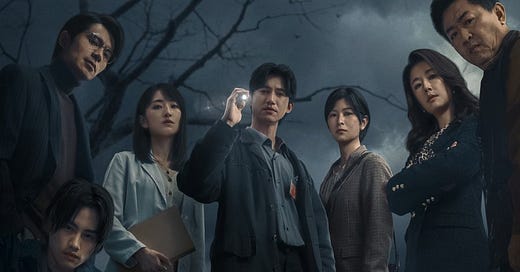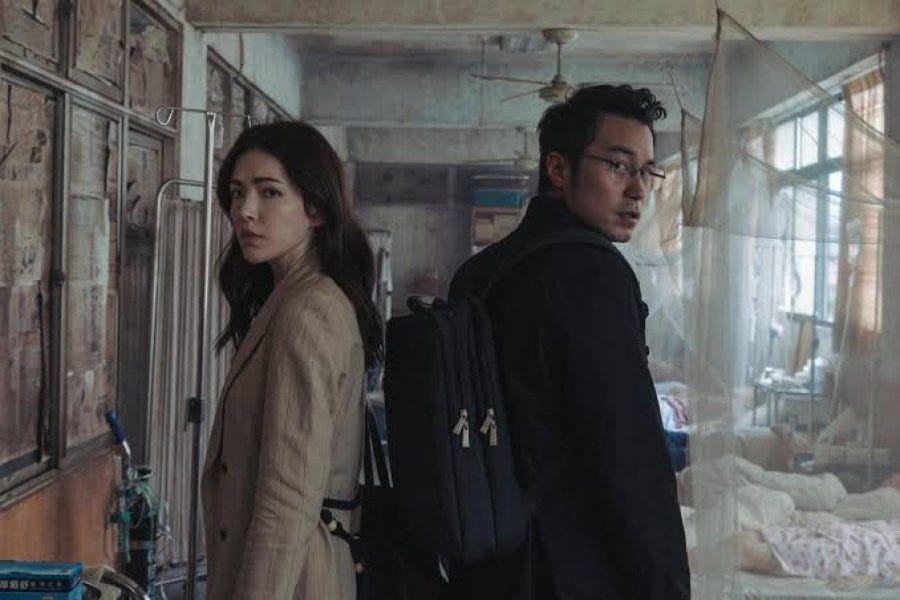It’s the long standing debate about whether we humans are born the way we are or perhaps environmental influences have far more of an impact on the formation of personhood. It’s the old nature vs nurture quandary. How do killers come about? Are they born or are they made? The answer seems obvious but then once in a while someone comes along and challenges all that we know about the human condition. Perhaps there’s real evil that lurks in the human heart regardless of the best of intentions. Parents get a bad rap in crime dramas these days. Bullies too. Even this vague amorphous entity called society. It makes sense of course because these influences come out of the formative years of one’s life. However it fails to explain why most people don’t commit heinous crimes or turn into serial killers even if they suffered parental neglect/abuse, or were bullied as children. Or are burdened with trauma. Indeed there are many factors at work. The world we all live in certainly isn’t perfect. No one in their right mind is deluded enough to think it’s fair for everyone. Injustices are a blight on our history because human beings are fallen creatures. And yet, not everyone crosses that line, goes ballistic and takes it out on their fellow human beings leaving a trail of devastation in their wake.
It’s the troubling side about any vaguely watchable show pertaining to serial killers. The temptation is to succumb to neat explanations about how these kinds of individuals emerge with psychological babble. I don’t question the facts that such unique people exist. A person’s environment is undoubtedly instrumental in their formative years. But the troubling question arises: if a criminal’s subsequent actions as an adult are mitigated by those facts, then who’s to blame? In order to elicit some measure of sympathy for the antagonists an over emphasis on their past injuries might end up being a double-edged sword. In order to avoid a simplistic view of criminals, the narrative could end up simplifying criminality.
Copycat Killer, a recent Taiwanese adaptation of a famous Japanese novel, attempts to navigate these landmines. It’s no mean feat and the debates about individual responsibility versus systemic breakdowns rage on. As far as production values go, it shouts quality. The performances are on point especially the very versatile Chris Wu who plays the show’s lead investigator. He is Guo Xiaoqi, a dedicated diligent prosecutor who finds himself embroiled in a series of sordid murders involving young women who were known patrons of a popular nightclub. This calamity sends the entire country reeling and understandably there’s plenty of pressure from within and without to put an end to these killings.
Chris Wu is absolutely stellar as Guo Xiaoqi. It’s still hard for me to believe that he’s the same actor who played the detestable Danny in Shards of Her but here he is effability itself. Those swoony mournful puppy eyes are guaranteed to win many hearts. He is the main reason why, despite taking detours that impede the progress of the plot, the show remains watchable. Guo Xiaoqi is the exemplary ordinary man that grounds all the hysteria and reckless insanity with his understated performance.
Copycat Killer is a thematically rich drama to be sure. There are more layers of sermonizing than mattresses for the princess who felt the pea under them all. This to my mind ends up sacrificing believability and pacing on the altar of moralizing. The only way to make sense of the overarching madness that afflicts all parties is to view it as a parable about social decay. It has all the outward vestments of a police procedurals but at its core, it is a finger wagging cautionary tale about social breakdown. The drama is unabashedly propagandist in its aims.
So it is with The Victims’ Game another offering from Taiwan also on Netflix. In almost every way this drama is the opposite of Copycat Killer. It features a brilliant neurodivergent forensics officer (Joseph Chang) who is searching desperately for his daughter who may be involved with a series of inexplicable deaths. The links between them escapes law enforcement initially. The premise is ridiculous if one gets too far preoccupied with details but the plot about the forgotten resentful people of society has a certain degree of ingenuity. The characters are patterned after the same types although not nearly as likeable as the ones in Copycat. Joseph Chang gives an excellent performance as a man trying to live with ASD among neural normals but only manages rubs his colleagues everywhere the wrong way. There’s no cutesy portrayal of autism here. Fang Yiren is a fish out of water with an agenda. He breaks professional codes left right and centre which makes him a far more ambiguous character. And more fascinating than other ASD characters I’ve been privy to. Still in the end he manages to be somewhat sympathetic because he knows better than anyone else that he hasn’t been the father that his daughter needs.
It is an arduous ask that when I watch these so-called police procedurals I am forced to choose between my expectations of what good detective work looks like and the human side of being confronted with a heinous crime. Shouldn’t I be able to hold cops to a higher standard of objectivity? Because their success ultimately hinges on them pushing aside their emotions for the greater good. Copycat and Victims’ Game are good melodramas but as whodunits, they break a cardinal sin or two for me. Cops make mistakes I’m sure but these fictional cops with their wild deviations are a persistent challenge to my ability to suspend all manner of disbelief.
The other aspect to both shows worth mentioning is the role of the media. It’s crucial to not just the solving of the crimes but in the case of Copycat, the show doesn’t hold back in its damning critique of the media in sensationalizing stories and adding fuel to fire. It used to be that the media was seen to report facts and hold authorities to account in democratic societies but in recent decades a certain hubris has afflicted the fourth estate. These days they aren’t content to be “reporters” but opinion shapers and propagators of narratives. There’s a reason why the term “fake news” has gained currency over the last few years. Journalists and broadcasters wear their biases on their sleeves in way they didn’t used to at least two decades ago. Tiffany Hsu’s journalist in Victim’s Game who on the one hand is positioned as an opposite to Fang Yiren with her ability to ingratiate herself and being extraordinarily glib is forced to deal with the press’ role in exacerbating the problem and emboldening perpetrators who are after attention. Furthermore Copycat Killer highlights the uncomfortable fact that these culprits relish the platform that the mass media provides. It becomes the stage by which their amoral agendas are given plenty of oxygen. What emerges out of this cacophony is the question of whether these perpetrators are as much the creation of media (legacy or new) ravenous for clicks, likes, ratings and ad dollars. For Victims’ Game, Tiffany Hsu puts in a good performance as ambitious scoop seeker Xu Haiyin who is not without genuine compassion for her subjects. In the end it is up to her to draw out the much alienated Fang Yiren to help him come to terms with his deeply repressed fears.
The world is a dangerous place. Made more so by the complex relationship between humans and the power of technology that we are prone to underestimate to our detriment.
It’s hard to say too much lest I tread into spoiler territory. I can speak only in general terms. With these shows, the less one knows about the plot, the better. I am of the view that both are worth a look. It has been a pleasure to dig up Taiwanese dramas with decent scripts lately. Although one should brace oneself for the graphic depictions of violence here especially against women. While The Victims’ Game scores extra points for a more original premise, I have a soft spot for Copycat Killer because of the journey that Guo Xiaoqi undergoes haunted by his own ghost while he struggles to be true to his own principles of justice.





Thanks for reviewing these Taiwanese dramas! I feel like many of them fly under the radar. And no wonder Chris Wu looked so familiar! His role here in COPYCAT KILLER was far more complex than his role in SHARDS OF HER, a drama I actually liked better. CK definitely feels more sensationalized, which makes sense given how media/news are such a core component of the story.
I will have to revisit THE VICTIM'S GAME. I think when it first came out, I watched the first couple episodes and then for some reason forgot to return to it. My memory is usually pretty fuzzy, but Joseph Chang's character left an impression.
I'm also currently watching LOVELY VILLAIN, another Taiwanese drama. The first two episodes have intrigued me and I'm hopeful that this will be another decent show.